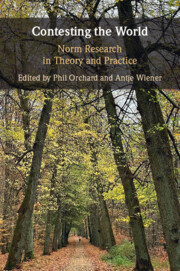Book contents
- Contesting the World
- Contesting the World
- Copyright page
- Contents
- Figures
- Tables
- Contributors
- Acknowledgements
- Abbreviations
- 1 Introduction
- Part I Norm Strength, Collisions, and Conflicts
- Part II Development of the Field
- 5 A Brief History of Norms about Race
- 6 Emotion and Norms in International Shaming Practices
- 7 Advancing Rights through an Accountability Norm?
- 8 Beyond Appropriateness
- Part III Meta-theorising, Linkages, and International Law
- Part IV Dimensions of Norm Contestation
- References
- Index
6 - Emotion and Norms in International Shaming Practices
from Part II - Development of the Field
Published online by Cambridge University Press: 01 November 2024
- Contesting the World
- Contesting the World
- Copyright page
- Contents
- Figures
- Tables
- Contributors
- Acknowledgements
- Abbreviations
- 1 Introduction
- Part I Norm Strength, Collisions, and Conflicts
- Part II Development of the Field
- 5 A Brief History of Norms about Race
- 6 Emotion and Norms in International Shaming Practices
- 7 Advancing Rights through an Accountability Norm?
- 8 Beyond Appropriateness
- Part III Meta-theorising, Linkages, and International Law
- Part IV Dimensions of Norm Contestation
- References
- Index
Summary
The significance of emotions is often implicitly addressed in norm research. Some International Relations (IR) scholars, for example, suggest a regulatory function of emotions when it comes to norm-based behaviour, norm compliance, norm persuasion, and norm contestation. Yet, the literature on norms often takes these affective dynamics for granted without making them explicit. This contribution seeks to address this imbalance by examining the relationship between emotions (as moral value judgements) and norms (as collective expectations about appropriate behaviour). Specifically, we extend the current analytical focus by proposing a framework for the empirical investigation of emotional resonance in norm research. We argue that emotional resonance is crucial to the impact and enforcement of international norms because emotions assign specific value to norms within normative orders. We identify pathways and build bridges between norm research and research on emotions in IR and develop a theoretical model to show how emotional resonance is helpful for explaining failures of norm compliance. The way in which the absence of emotional resonance facilitates non-compliance is illustrated by the example of the Bush administration’s reaction to torture allegations in Abu Ghraib and Guantanamo.
- Type
- Chapter
- Information
- Contesting the WorldNorm Research in Theory and Practice, pp. 101 - 114Publisher: Cambridge University PressPrint publication year: 2024
- 1
- Cited by

